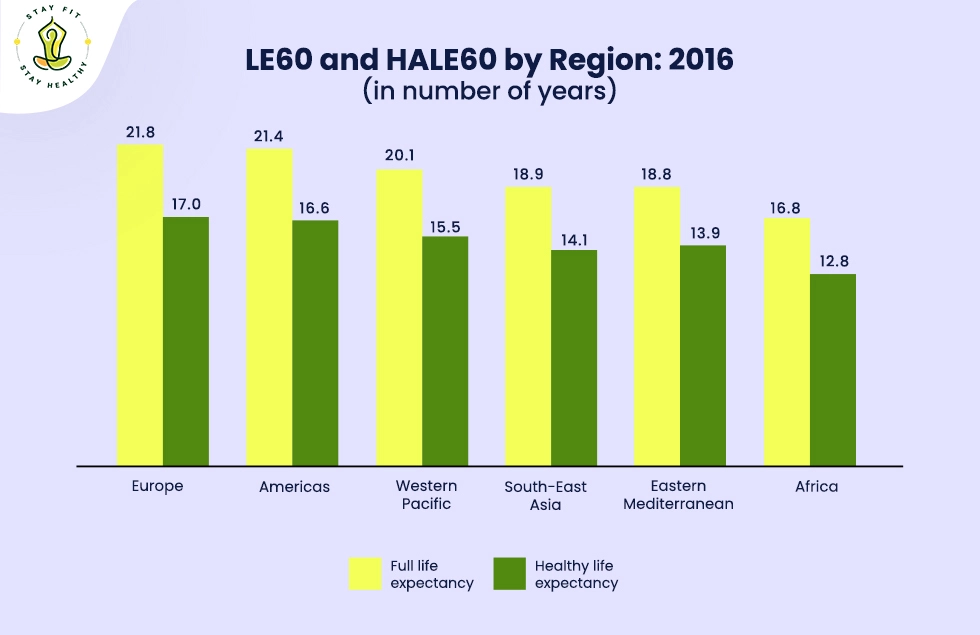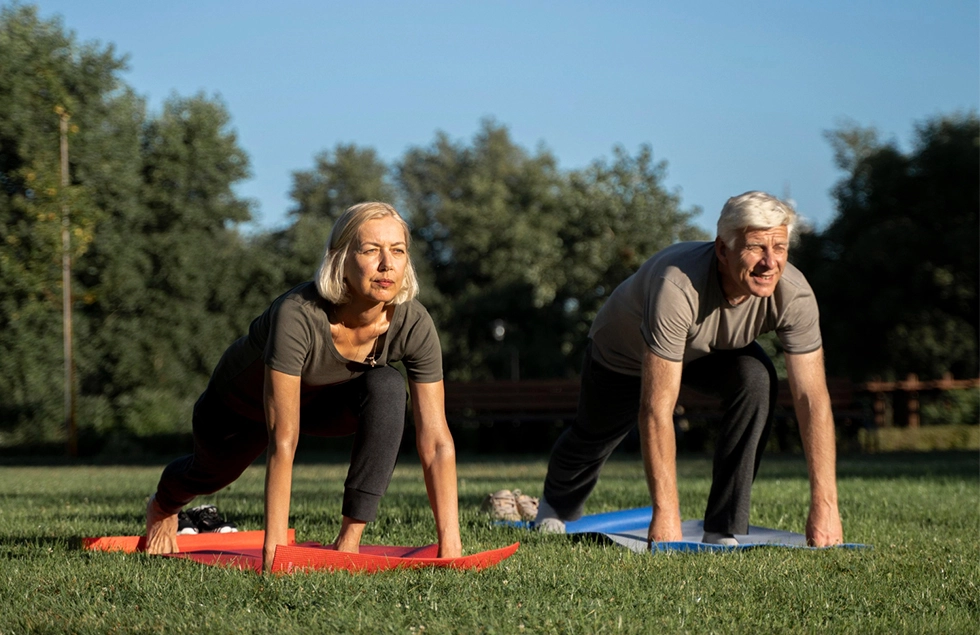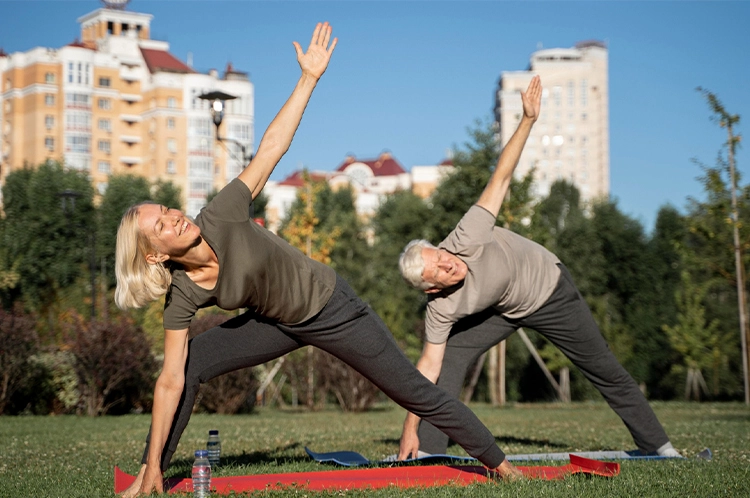Aging Gracefully: Why Staying Fit Matters
As we age, it’s natural to experience changes in our bodies. But what if we could defy those expectations? What if we could maintain our vitality, strength, and energy well into our golden years? The secret lies in healthy aging and a crucial component of that is staying fit.
One of the biggest challenges for individuals over 50 is staying fit. As we age, our metabolism slows down, and it can become more difficult to maintain a healthy weight. Additionally, age-related conditions such as arthritis, osteoporosis, and heart disease can make it challenging to stay active. However, with the right strategies, it’s possible to overcome these obstacles and enjoy a fulfilling and healthy life.
In this blog post, we’ll provide you with seven top tips for staying fit after 50. These tips are based on scientific research and the experiences of countless individuals who have successfully aged gracefully.
|
Aspect |
Older Adults who Workout |
Older Adults who don’t workout |
| Physical Health | Better muscle build and flexibility which reduces risk of major injury. | Higher risk of unjust due to muscle loss and stiffness. |
| Cardiovascular Health | Better physical health reduces the risk of heart problems. | Increased risk of heart problems. |
| Mental Health | Reduced risk of depression, anxiety and cognitive decline. | Higher likelihood of depression and anxiety. |
| Social Interactions | More opportunities to interact with fellow gym guys or cardio buddies. | Limited social interaction which can lead of isolation |
| Lifespan | Longer lifespan because of lower risk of heart problems and injury | Shorter lifespan because of higher risk of heart problems and injury. |
Longevity and Healthy Aging in the United States
When we talk about aging well, it’s not just about living longer but also living healthier. In the United States, while people can expect to live a good number of years after turning 60, the quality of those years is a different story.
According to recent data, the average American aged 60 can expect to live another 23.3 years. However, only about 17.9 of those years are expected to be healthy. This means that many older Americans spend a significant portion of their later years dealing with health issues.
 (Source: Stayhealthyandstayfit)
(Source: Stayhealthyandstayfit)
Table: Longevity and Healthy Aging Statistics in the United States
| Statistic | Value |
| Life Expectancy at Age 60 (LE60) | 23.3 years |
| Healthy Life Expectancy at Age 60 (HALE60) | 17.9 years |
| Global Ranking (LE60 and HALE60) | 31st |
| Regional Ranking (Americas) | 5th |
| Gender Differences (HALE60) | Men: 16.7 years, Women: 19.0 years |
| Fair or Poor Health (Age 65+) | 23.5% |
These statistics highlight the importance of prioritizing healthy aging. By adopting a healthy lifestyle, you can not only increase your lifespan but also improve the quality of your later years. The following tips will help you age gracefully and maintain your overall well-being. It is never too late to start making positive changes for a healthier future.
Tip 1: Prioritize Regular Exercise
Exercise is essential for healthy aging. It can help improve physical health, mental well-being, and reduce the risk of chronic diseases. Regular physical activity can also help maintain bone density, improve balance and coordination, and boost energy levels.
A study published in Circulation found that adults who engage in more than the recommended amount of physical activity can significantly lower their risk of death. Adding just 10 minutes per day to your routine can reduce your annual death risk by 7%.
 (Source: Freepik)
(Source: Freepik)
When it comes to choosing exercises, it’s important to find activities that you enjoy. This will make it more likely that you’ll stick to your exercise routine. Some great options for older adults include walking, swimming, yoga, and strength training.
It’s also important to start slowly and gradually increase the intensity and duration of your workouts. This will help prevent injuries and make it easier to stick with your exercise routine. Remember, it’s never too late to start exercising. Even small amounts of physical activity can make a big difference.
Tip 2: Maintain a Balanced Diet
A healthy diet is another important component of healthy aging. Eating a balanced diet can help you maintain a healthy weight, reduce your risk of chronic diseases, and improve your overall well-being.
Key nutrients in a longevity diet include:
| Nutrient | Sources | Function and Benefits |
| Protein | Meat, poultry, fish, dairy, legumes, nuts, seeds | Essential for tissue repair, muscle maintenance, and bone health. |
| Calcium | Dairy products, leafy greens, fortified foods | Crucial for bone health and helps prevent osteoporosis. |
| Vitamin D | Sunlight, fatty fish, fortified foods | Regulates calcium absorption and is essential for bone health. |
| Fiber | Whole grains, fruits, vegetables | Promotes digestive health, blood sugar control, and weight management. |
| Omega-3 fatty acids | Fatty fish (salmon, mackerel), walnuts, flaxseeds | Reduces inflammation and supports brain health. |
| Antioxidants | Berries, dark chocolate, green tea, spinach | Protects cells from free radical damage. |
Your diet should be rich in fruits, vegetables, whole grains, lean proteins, and healthy fats. These foods provide essential nutrients, including vitamins, minerals, and fiber, that your body needs to function properly.
It’s also important to stay hydrated by drinking plenty of water throughout the day. Dehydration can lead to several health problems, including fatigue, constipation, and headaches.
In addition to eating a balanced diet, it’s important to avoid excessive intake of processed foods, sugary drinks, and unhealthy fats. These foods can contribute to weight gain, heart disease, and other health problems.
Tip 3: Get Adequate Sleep
The American Academy of Sleep Medicine (AASM) states that sleep is essential for health, well-being, and public safety. Healthy sleep involves not only adequate duration but also good quality, appropriate timing, regularity, and the absence of sleep disorders.
Insufficient sleep and untreated sleep disorders can negatively impact physical health, mental health, mood, and safety. The AASM emphasizes the need for greater awareness of sleep health in various settings, including education, clinical practice, and public health promotion.
 (Source: Freepik)
(Source: Freepik)
Technically, you don’t need rucking equipment. You can create DIY weights by adding more books to your laptop or adding bricks that have been cleaned and covered with duct tape. But if you think you are serious, you can buy specialized rucking equipment. This includes specialized backpacks and weight plates that perfectly fit in the bag without bulking it.
Remember that your obsession with equipment shouldn’t overshadow your workout.
Tip 4: Manage Stress Effectively
Stress is a common experience for people of all ages, but it can be particularly challenging for older adults. Chronic stress can negatively impact physical and mental health, leading to a variety of problems such as high blood pressure, heart disease, and depression.
It’s important to find healthy ways to manage stress. Some effective stress management techniques include meditation, deep breathing exercises, yoga, and spending time in nature. It’s also important to have a strong social support system and to seek professional help if stress becomes overwhelming.
Tip 5: Stay Socially Active
Social connections are essential for mental and emotional well-being, especially as we age. Loneliness and isolation can contribute to depression, anxiety, and cognitive decline.
 (Source: Freepik)
(Source: Freepik)
To stay socially active, try to participate in social activities, volunteer, or join clubs and groups. Spending time with friends and family can also help reduce stress and improve your mood.
Tip 6: Consider Supplements and Alternative Therapies
While a balanced diet can provide most of the nutrients your body needs, some older adults may benefit from taking supplements. For example, vitamin D and calcium are important for bone health, and omega-3 fatty acids can help support heart health.
| Supplement | Benefits |
|---|---|
| Vitamin B12 | Essential for nerve function and energy production. Supports red blood cell formation and helps prevent anemia. |
| Coenzyme Q10 (CoQ10) | Supports heart health by aiding in energy production within cells. Acts as an antioxidant, protecting cells from oxidative damage. |
| Probiotics | Improve digestive health by promoting a balanced gut microbiome. Enhance nutrient absorption and support immune function. |
| Calcium and Vitamin D | Essential for bone health, especially as we age. Calcium maintains bone density, while vitamin D aids in calcium absorption. Helps prevent osteoporosis and fractures. |
| Omega-3 Fatty Acids | Support heart health by reducing inflammation and improving lipid profiles. Found in fish oil supplements or through dietary sources like fatty fish and flaxseed. |
| Magnesium | Supports muscle function, nerve transmission, and bone health. Helps regulate blood pressure and blood sugar levels. |
| Turmeric (Curcumin) | Has anti-inflammatory properties and may benefit joint health. Consider curcumin supplements or include turmeric in your diet. |
| Vitamin K2 | Works alongside calcium and vitamin D to maintain bone health. Helps direct calcium to bones and teeth, preventing the calcification of arteries. |
It’s important to consult with a healthcare professional before starting any new supplements or alternative therapies. They can help determine if supplements are right for you and recommend appropriate dosages.
Some alternative therapies, such as acupuncture and massage, may also help promote relaxation and reduce stress. However, it’s important to choose a qualified practitioner and consult with your doctor before trying any new therapies.
Tip 7: Stay Curious and Engaged
Mental stimulation is essential for cognitive health, especially as we age. Engaging in activities that challenge your mind can help prevent cognitive decline and improve memory.
Try to learn new skills, engage in hobbies, and stay up-to-date on current events. Reading, playing games, and doing puzzles can also help keep your mind sharp.
By staying curious and engaged, you can continue to learn and grow throughout your life. This can help you maintain a sense of purpose and fulfillment as you age.
One actor who has fooled everyone with his age is Tom Cruise. The way he climbs mountains and then jump from them at the age of 58 is unbelievable. Here are his 3 secrets:
Conclusion – Age with Grace!
Aging gracefully doesn’t mean slowing down; it means thriving. By incorporating these seven tips into your lifestyle, you can maintain your vitality, strength, and energy well into your golden years. Remember, it’s never too late to start. Prioritize regular exercise, maintain a balanced diet, get adequate sleep, manage stress effectively, stay socially active, consider supplements and alternative therapies, and stay curious and engaged. With a little effort and commitment, you can enjoy a fulfilling and healthy life at any age.

